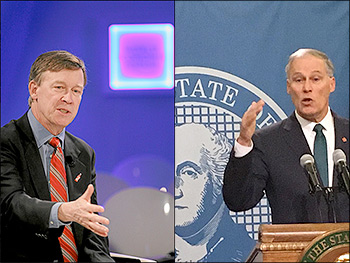By Jim Ellis
May 3, 2019 — Colorado Gov. Jared Polis (D) announced this week, as expected, that his state’s new primary will move to March 3, 2020, which has clearly become the next presidential cycle’s Super Tuesday.
 Previously, Colorado employed the caucus system to apportion delegates, but voters changed to a primary when passing a 2016 ballot initiative, so now the state’s 67 Democratic first-ballot delegates and 37 Republican convention votes will be apportioned through a primary election.
Previously, Colorado employed the caucus system to apportion delegates, but voters changed to a primary when passing a 2016 ballot initiative, so now the state’s 67 Democratic first-ballot delegates and 37 Republican convention votes will be apportioned through a primary election.
But the Centennial State voters and the Democratic National Committee rules appear to be at odds. According to news reports, the 2016 Colorado electoral primary ballot initiative not only transformed into a primary, but also adopted a winner-take-all apportionment format. While Republicans allow states to award all of their delegates to one candidate based upon a primary or caucus victory, the Democrats, under the McGovern reform rules adopted after the 1972 presidential election, do not.
While the state may want to make the winner-take-all option determinative, the procedure violates Democratic rules, so we could see yet another pre-convention issue develop before the Credentials Committee, the body that certifies all of the delegate votes prior to the convention officially beginning.
The 2020 Democratic nomination process is becoming seriously front-loaded, which could play to the party’s detriment. By rule, only four states, referred to as “The First Four,” may vote before March 1 in the presidential year: Iowa (caucus, 41 first-ballot delegates), New Hampshire (primary, 24), Nevada (caucus, 36), and South Carolina (primary, 54). But just three days after South Carolina concludes, the following Tuesday, March 3, could become the most significant date of the early campaign.
Now that Colorado has joined the 3/3 fold, the following states will vote (in parenthesis, are the number of first ballot votes each entity possesses under the Democratic delegate apportionment formula):
- Alabama (52)
- American Samoa (6) – presumed to be voting this day
- Arkansas (31)
- California (416)
- Colorado (67)
- Democrats Abroad (13)
- Georgia (105)
- Massachusetts (91)
- Minnesota (75)
- North Carolina (110)
- Oklahoma (37)
- Tennessee (64) – probable, but has not yet set the calendar
- Texas (228)
- Utah (29)
- Vermont (16)
- Virginia (99)


 March 25, 2018 — Only nearing the end of March in the off-year, already a great deal of early 2020 Senate action has occurred. Thus, it is a good time to begin reviewing all 34 statewide federal races that will adorn next year’s ballot in a three-part series. Today, we look at the first dozen in alphabetical order:
March 25, 2018 — Only nearing the end of March in the off-year, already a great deal of early 2020 Senate action has occurred. Thus, it is a good time to begin reviewing all 34 statewide federal races that will adorn next year’s ballot in a three-part series. Today, we look at the first dozen in alphabetical order:

